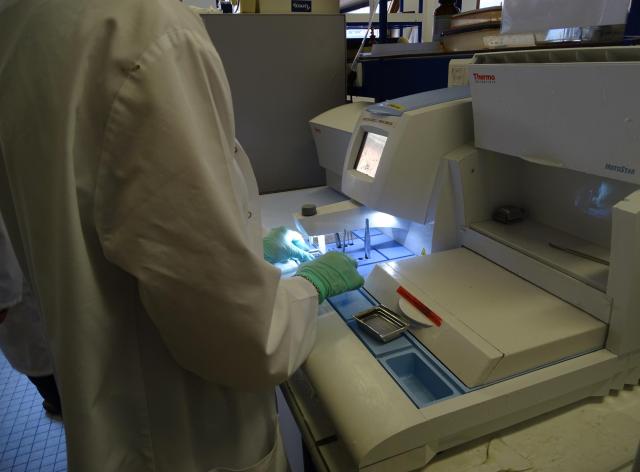Our platform offers a wide range of fluorescence microscopes covering a broad field of applications. We offer 2D, 3D and 4D imaging approaches, suitable for studying isolated cells, spheroids or organoids, complex tissues or entire small organisms. Our equipment allows you to observe subcellular structures at the nanometric scale and track highly dynamic cellular processes.
Personalized support for your project
- Design of imaging strategies and experimental plans in line with scientific objectives.
- Expert advice on sample preparation, microscope selection and configuration, image quantification and data interpretation.
- Training in the use of microscopes and image analysis software.
- Customized image processing and analysis, tailored to the data and scientific questions at hand.
- Automation of imaging and image analysis through the development of customized macros and scripts.
- Services provision

Equipment
Leica SP5
Conventional confocal microscope that enables multicolor imaging and Z-stacks on fixed samples.
Zeiss LSM900 Airyscan
A highly versatile confocal microscope offering all the features expected of a state-of-the-art microscope. It is equipped with an Airyscan 2 detector for high-resolution 2D and 3D imaging. It also features an incubation chamber, a module for multi-position imaging, and an AI module for automatic sample detection.
Zeiss Cell Discoverer 7
Confocal and epifluorescence microscope specialized in automated imaging and imaging of thick samples. It offers 12 possible magnifications with objectives that can be adjusted to the thickness of the sample and the support. It detects and calibrates itself on samples and can easily be automated for imaging complete multi-well plates. It is equipped with an Airyscan detector, an incubation chamber and an automatic immersion system.
Gataca TIRF azimuthal & spinning disk
System specialized in imaging highly dynamic cellular processes. It features an azimuthal TIRF (Total Internal Reflection Fluorescence) module and a spinning disk module (Yokogawa), and is equipped with an incubation chamber. The spinning disk module has a high-resolution imaging mode (live-SR) in 2D and 3D, compatible with rapid acquisitions. The TIRF module is specially designed to observe biological events occurring at the cell-substrate interface, such as endocytosis.
Zeiss Lattice Lightsheet 7
Microscope designed for rapid volumetric imaging in four dimensions (3D + time). It allows dynamic observation of cells or small living organisms (up to approximately 200 µm) in their entirety, imaging a complete volume per second. It can achieve sufficient resolution to distinguish subcellular structures and has very low phototoxicity.
Abberior STEDYCON
Easy-to-use STED (Stimulated Emission Depletion) microscope, enabling two color super-resolution and four-color confocal resolution. A maximum resolution of 40nm can be achieved in 2D on fixed samples.
Abberior INFINITY
Advanced STED (Stimulated Emission Depletion) microscope dedicated to super-resolution. It can achieve a resolution of 30nm in 2D or 75nm isotropic in 3D. It has a high signal-to-noise ratio Matrix detector and can perform FLIM (Fluorescence Lifetime Imaging Microscopy) measurements at STED resolution. It is also equipped with an incubation chamber for imaging live cells.
Sartorius Incucyte S3
Automated imaging system for imaging cell cultures over several days or even weeks using transmitted light or fluorescence. It can monitor the health of cell cultures, measure morphological changes, and perform functional tests such as proliferation or migration.
Image analysis
The platform has a powerful computer dedicated to image processing and analysis.
Software
- Arivis Pro
- Zen
- Huygens
- Icy
- FIJI
Contact
- Henri-François Renard| Academic Manager
henri-francois.renard@unamur.be - Alison Forrester | Academic Specialist
alison.forrester@unamur.be - Benjamin Ledoux | Research Logistician
benjamin.ledoux@unamur.be - Catherine Demazy | Technician
catherine.demazy@unamur.be



